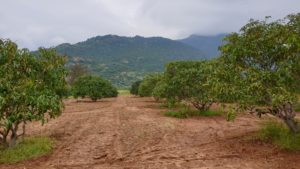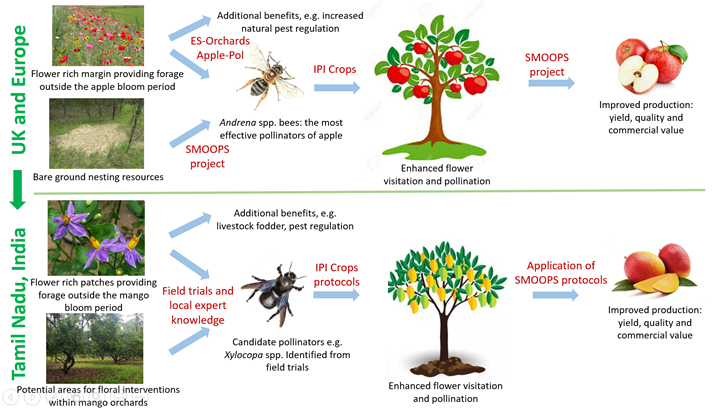About Project Tropical:
TROPICAL stands for Translating Research Opportunities to enhance Pollination benefits to economically Important Crops And improve Livelihoods. The project funded by the Global Challenges Research Fund (GCRF) is led by the University of Reading, UK, in partnership with the MS Swaminathan Research Foundation (MSSRF) and the Reddiarchatram Seed Grower’s Association (RSGA) in India.
The main aim of this project is to enhance the productivity and yield stability of Mango and Moringa, which are two economical important crops for smallholder farms in Tamil Nadu, India, by improving pollination service provision. This project has been co-designed by researchers from the two countries alongside the stakeholder community from the inception stage
Key Objectives of this project:

- To utilise the evidence generated by prior BBSRC and NERC research on enhancing crop pollination
- To combine existing evidence with local expert knowledge to determine the context-specific floral enhancements.
- To support user-led decision-making for men and women farmers to choose the best interventions to boost crop pollination.
- To promote peer-to-peer knowledge exchange through workshops and demonstration days
The University of Reading team of PI and Co-Is on this proposal have been at the forefront of developing and testing the science underpinning the optimisation of pollination service delivery to improve the yield and quality of economically important crops such as apples. The novel pollinator/pollination management practices underpinned by our research have helped inform the management of pollination services in the UK and across the EU. These methods can be readily translated into context-specific ecological interventions in other cropping systems to improve crop pollination. Our aim is to utilise our research to enhance sustainable crop production and farming systems in ODA countries and for this proposal, we are working with smallholder farmers in the state of Tamil Nadu in India. This is a state of 67 million people, with ~45% relying on agriculture as their primary livelihood.

India has many crops of high economic and nutritional value with around 50 million hectares of pollinator-dependent crops: The 1.2 million managed honeybee colonies that currently exist are currently insufficient to meet the crop pollination demands leading to potential loss of yield and profit. There is a significant opportunity, therefore, to enhance production through improved pollination by wild pollinator communities.  Mango and Moringa are two major crops that are highly dependent on insect pollination and would be ideal crops in which to adapt and tailor specific interventions already used in UK production systems. Mango cultivation covers 1,327,000 hectares in Tamil Nadu with a net income of ~$6500 (USD) per hectare per annum. Moringa crops cover 13,250 hectares in the same state with a net income of ~$4000 (USD) per hectare per annum. These two crops, therefore, form an important part of smallholder livelihoods in the state of Tamil Nadu in India which lies in a semi-arid agro-ecosystem, especially in the context of climate change.
Mango and Moringa are two major crops that are highly dependent on insect pollination and would be ideal crops in which to adapt and tailor specific interventions already used in UK production systems. Mango cultivation covers 1,327,000 hectares in Tamil Nadu with a net income of ~$6500 (USD) per hectare per annum. Moringa crops cover 13,250 hectares in the same state with a net income of ~$4000 (USD) per hectare per annum. These two crops, therefore, form an important part of smallholder livelihoods in the state of Tamil Nadu in India which lies in a semi-arid agro-ecosystem, especially in the context of climate change.
The Reading team have strong partnerships with key Indian organisations M.S. Swaminathan Research Foundation (MSSRF) and Reddiarchatram Seed Grower’s Association (RSGA) which have been used to co-develop this project and ensure effective translation of our BBSRC research findings into Indian production systems. We aim to adapt floral interventions proven to be effective across a range of EU crops to enhance the abundance and diversity of wild pollinators within Indian crop systems and assess potential additional benefits to farmers such as fodder for cattle, the secondary economic benefits from the sale of flowers or produce, and/or enhanced pest regulation. The choice of the specific floral interventions will be decided based on discussions with local experts and men and women farmers who will be the key end-users of these approaches. This project will form the basis of a roadmap for the wider rollout of this approach to other insect-pollinated crops across India and in other ODA countries.
